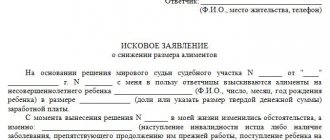If, after the first cassation, you do not agree with the decision of the regional court, then take the chance to protect your interests in the highest judicial body of Russia - the Supreme Court. This court is the second cassation instance, which considers complaints in civil cases of all constituent entities of the Russian Federation. For this purpose, civil procedural legislation establishes a certain appeal procedure, filing deadlines and requirements for the content of a cassation appeal.
In this article, we share our experience of appealing to the Supreme Court and provide proven legal advice: how to file a complaint; what to write in the cassation; what are the deadlines for submission? chances of winning the lawsuit. As well as a detailed action plan for the course of the trial in the RF Armed Forces.
Where to file a complaint after the first cassation
So, according to the new reforms in the Code of Civil Procedure of the Russian Federation, the cassation appeal procedure in our country takes place in two stages. The first stage is the filing and consideration of a complaint in a cassation court of general jurisdiction of a regional subject of the Russian Federation. After the first cassation, the second stage follows - an appeal to the Supreme Court, the same for all subjects of the Russian Federation. We note that the complaint is being filed with the Judicial Collegium for Civil Cases of the Supreme Court. The application procedure at this stage is much simpler, since you submit all documents directly to the court, in a convenient way (electronically, in person or by mail).
Please note that in accordance with the norms of the Code of Civil Procedure, the Supreme Court, in the cassation procedure, checks the legality of previously adopted court decisions, in contrast to the appeal, where you can also refer to the unfoundedness of the judges' decisions.
Legal assistance in appealing to the Supreme Court
Consultation in the office and by phone
+7(495) 728-99-14
Help from a lawyer. 19 years of experience in appealing to the Supreme Court!
Procedure for consideration
Legal proceedings in the supervisory authority, according to the rules of the Code of Civil Procedure, proceed as follows.
- If the application is submitted correctly, the authority issues a corresponding act on its acceptance into its proceedings.
- Copies filed with the application are sent by the court to the parties involved along with the summons.
- The judge who accepted the application and issued the corresponding act does not have the right to participate in the direct consideration.
- At a meeting of the court composition in the supervisory authority, the circumstances of the appeal are explained to him by the judge, who accepted the complaint and acts as a rapporteur in the proceedings.
- Other participants in the process are also entitled to provide explanations on the situation, but this is not obligatory.
- The decision in the supervisory body is made by voting by the composition of the court with the votes of an absolute majority.
Usually the decision is not announced during the review process. Participants will be informed about this additionally.
Deadlines for filing with the Supreme Court after cassation
The deadline for filing a complaint with the Supreme Court starts immediately after the first cassation, that is, from the day the act is announced by the cassation court of your region. The deadlines are fixed in the Civil Procedure Code and amount to 3 months, beyond which an appeal is impossible, without compelling reasons for missing the period for filing a cassation with the Supreme Court.
However, in our experience, the Chairman of the Supreme Court can accept your complaint for consideration if the reason why the deadline was missed was valid (including illness, long business trip, caring for relatives). To do this, you will only need to submit the appropriate petition along with the main package of materials submitted to the Supreme Court.
We advise, after the cassation, not to delay the appeal, since this time is better spent preparing a legally competent complaint to the Supreme Court, and thereby increase the chance of winning the trial.
What is the difference between cassation in the Supreme Court?
The differences between the cassation appeal to the Supreme Court and the previous complaint are due to the specifics of the judicial proceedings in the Supreme Court. The main task of the highest judicial body is to correct law enforcement practice and form a unified position, namely to eliminate gaps in legal understanding.
Since after cassation the Supreme Court is the final authority for appealing judicial acts, the appeal procedure is possible only after a preliminary verification of your cassation appeal. The check is carried out by the filter judge for compliance with the conditions imposed by the Code of Civil Procedure, not only for the format and content of the application, but also for the position of the applicant. Based on the results of which you receive a notification about the acceptance of the cassation or its rejection.
Unlike the first cassation, your appeal to the Supreme Court demanding a review of the case should be radically different in motivation, justification, emphasis and structure of presentation of the cassation appeal. In other words, it is not enough to simply duplicate the text of the first cassation appeal for the Supreme Court.
We remind you. At this stage, the panel will only check the errors of the lower courts, and therefore you do not need to set out the circumstances of the case.
You cannot justify your position by evaluating the evidence. The main task at this stage is for the board to decide to request all case materials from the archive, since after they are requested, the likelihood of inviting you to cassation is highest.
How to write a complaint to the Supreme Court (second cassation)
After cassation, without complying with formal requirements, it is impossible to initiate an appeal procedure in the Supreme Court. Therefore, before submitting documents to the Supreme Court, you need to carefully study the criteria for them. Other requests not provided for by procedural legislation should not be contained in the basis of the cassation appeal.
As follows from the articles of the Code of Civil Procedure, the complaint (second cassation) must contain:
- Information about the court considering the appeal (division of the Supreme Court, address)
- Your data and procedural status (full name, address, applicant - defendant or plaintiff)
- Data of other participants in the case (your representatives - a lawyer or lawyer, the other party to the dispute - the plaintiff or defendant, third parties)
- The subject of the dispute, information about the act being appealed and other decisions and determinations adopted in the case.
- Grounds for appeal. In this part of the cassation it is necessary to indicate what the violations are and provide arguments confirming the applicant’s position, i.e. yours. Based on our experience in appeals to the Supreme Court, we recommend that you indicate the sheet numbers of archival materials; it is not recommended to attach copies, since in this case the case will not be retrieved from the archive. We also note that such a characteristic as materiality is evaluative, depends on the judicial discretion and is established in relation to each specific dispute.
- Indications of legal norms and laws that confirm the presence of violations committed in court decisions, appeals or after the first cassation.
- Your requirements are stated at the end of the cassation appeal to the Supreme Court. We will clarify that since the competence of judges at this stage is limited, it is impossible to ask for a re-evaluation of evidence and circumstances.
- Application documents.
Note. You can ask for a new decision or a new trial depending on whether there is a need for further examination of the evidence and re-evaluation of the available data.
Powers of the Chairman of the RF Armed Forces. Contents of the pleading part of the complaint
The Chairman of the Supreme Court is the very top of the judicial hierarchy. But it is within the procedural framework of the complaint to the chairman that he can only once again examine the complaint, cancel the ruling of the lower judge of the Supreme Court and transfer the complaint for consideration to the meeting. He himself cannot make a final decision on the complaint, cancel or change the decision. Accordingly, you can only ask him for one thing - “I ask you to transfer the cassation appeal for consideration at the meeting.”
Who exactly reads the complaint to the chairman? It must be read by the chairman himself or his deputy. However, there is a whole apparatus for such complaints. And judging by the responses to such complaints, they do not deal with special legal motivations, they write very briefly. The deputy chairman signs the response to the complaint. But sometimes, although rarely, complaints work. And they request the case and return it “down.”
Plan of cassation appeal to the Supreme Court
After cassation, the appeal to the civil division of the Supreme Court is progressing according to plan:
Step 1 . Prepare a new cassation appeal and attachments to it. The package of documents will depend on the submission method you choose. There are various ways to contact the Supreme Court. For example, through the website of the Supreme Court supporting the electronic filing service. In this case, you will only need to fill out the registration data on the State Services portal, fill out the proposed form and attach a scan of the cassation and receipt of payment of the state duty. From our experience, we believe that the advantage of the electronic method of filing documents is that there is no need to attach numerous copies of acts of lower authorities. You can also submit a package of documents in the classic way: in person or by mail.
What else do you need to attach to the original complaint to the Supreme Court:
- Its copies according to the number of persons participating in the case.
- Certified copies of the acts being appealed (confirmation of sending to persons is not required). We would like to remind you that the cassation rulings, appellate decisions, and court decisions you enclose must contain the blue stamps of the court that made these decisions.
- Receipt of payment of the state duty (the amount for individuals is 150 rubles. If you are exempt from paying the state duty in other authorities, when submitting an application at this stage you also do not pay the fee).
- Power of attorney for a representative (if he is involved in filing a cassation appeal to the Supreme Court).
STEP 2. Wait for the results of the initial review of the complaint by the filter judge. Depending on the method chosen, you will receive a notification in writing (by mail) or electronically (the status of your application will change from “received by the court” to “accepted for proceedings” in your personal account)
STEP 3 . If the cassation is accepted, a date will be set for consideration of the dispute in the Supreme Court. In our experience, the dispute will be resolved within two or three months (depending on whether the case was requested from the archive).
Important. The Convention for the Protection of Human Rights and Fundamental Freedoms gives you the right to file a supplement to your appeal.
Consultation on appeal to the Supreme Court
+7(495) 728-99-14
Preparation of cassation appeals in the RF Armed Forces. Appeal to the Supreme Court. Lawyer for complaints to the Supreme Court.
Government duty
Payment of the state fee is a mandatory condition for accepting an application to cancel a court act that has gained legal force.
Without this, applications will not be submitted. In this case, the court is entitled to refuse to accept this application until this deficiency is eliminated. The amount of the fee paid when sending a complaint to the supervisory authority is small.
Namely:
- individuals pay 200 rubles;
- enterprises and organizations pay 4,000 rubles;
- government agencies, the Attorney General or deputies do not pay this fee.
If there are not enough funds to pay the fee, and the time for filing the application is running out, you need to submit it with a request for a deferment in its payment. The supervisory authority issues a special act - a ruling - regarding the satisfaction of the request or otherwise.
Is it possible to win in the Supreme Court on cassation?
Despite the fact that judicial acts that have entered into legal force provide for the possibility of appeal in a supervisory procedure, there are special strict grounds for review. Not every case can be considered in cassation by the Presidium of the Supreme Court (in practice, 0.1% of applications are considered in this manner)
Thus, a second cassation review is your last chance to get controversial court decisions overturned and restore violated rights on substantive and procedural grounds, since most often a refusal ruling is issued, which is associated with incorrect reasoning of the request.
The second factor determining the need for a legally competent drafting of a cassation appeal is that in order to take advantage of further international protection (ECHR), it is necessary to exhaust all domestic remedies, therefore it is necessary to draw up a document that will not only contain all the necessary information, but also will seem sufficiently motivated to the filter judge to be considered by the RF Supreme Court.
The filter judge of the Supreme Court may refuse to transfer a cassation that does not meet the requirements of the Code of Civil Procedure, therefore it is necessary to draw up this procedural document competently and taking into account the peculiarities of the process and the instance.
Who has the right to appeal?
Issues of appealing decisions of control (supervisory) bodies, actions (inaction) of their officials are regulated by Chapter. 9 of the Federal Law of July 31, 2020 No. 248-FZ “On State Control (Supervision) and Municipal Control in the Russian Federation” (hereinafter referred to as Law No. 248-FZ).
Based on Art. 39 of Law No. 248-FZ, a controlled person (individual, individual entrepreneur or organization) against whom the following have been accepted or committed (Part 4 of Article 40 of Law No. 248-FZ) can file a pre-trial complaint:
- decision to carry out control (supervisory) activities;
- acts of control (supervisory) measures, orders to eliminate identified violations;
- actions (inaction) of officials (inspectors) of the control (supervisory) body within the framework of control (supervisory) activities.
From 2023, an appeal to the court is possible only after a pre-trial procedure. This applies only to legal entities and individual entrepreneurs.
But from July 1, 2022, an experiment is being carried out: Resolution of the Government of the Russian Federation dated April 28, 2021 No. 663 approved the list of types of federal state control (supervision), for which a pre-trial appeal procedure is mandatory.
For more information, see “ When a pre-trial complaint against state control (supervision) is mandatory: list from 07/01/2021 ”.
The basis for filing a complaint is simply the opinion of the controlled person that his rights and legitimate interests were directly violated as part of control (supervision).
Please note that the Regulations on the type of municipal control may establish that pre-trial appeal is not applied unless otherwise prescribed by the federal law on the type of control, the general requirements for the organization and implementation of this type of municipal control, approved by the Government of the Russian Federation.







